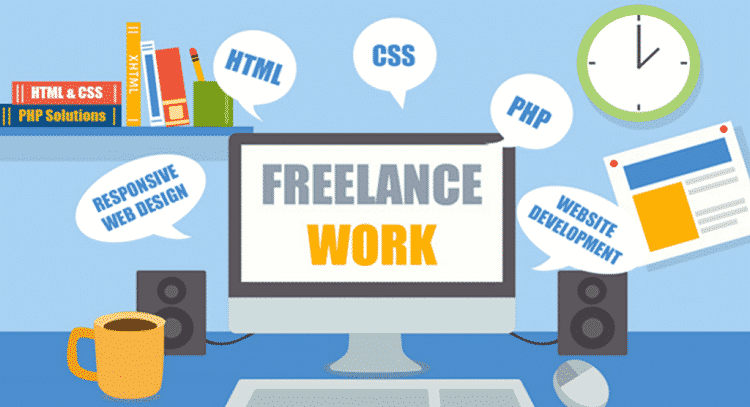Hiring a Freelance web designer is the defining moment in your product’s journey from prototypes and high-fidelity UI mockups to a living product that is ready for consumer use. However, finding the right talent can be challenging, as a web designer’s specialization can get rather broad—roles often overlap and the technology they build on evolves daily. This guide looks at the key roles a web designer may play in your business, as well as the skillsets required to successfully build your product.
A freelancer is a self-employed professional who works for multiple businesses or companies rather than one organization. While freelancers primarily work in creative industries, they may work in nearly any line of work. If you’re responsible for hiring employees for your organization, you may benefit from learning about the freelance hiring process. In this article, we discuss some reasons to hire a freelancer web designer, explain the steps you can take to do so, and list factors to consider when hiring a freelancer.
Having a web designer on your team can be exciting. At this point, your idea is most likely in the process of being integrated from a universe of sketches, prototypes, and intricate back-end code into a live and successful product.
Hiring a freelance web designer can be a demanding process. It’s a daunting task when trying to understand and coordinate everything that’s required in order to fulfill your production needs as well as look after your business goals and the users’ constantly evolving expectations.
Defining the needs and expectations required to accomplish all this really depends on the stage you have reached with your product or service. “Web designers” wear many hats—intuitive user flows, visually appealing layouts, inspiring interactions, and efficient HTML/CSS code can all be provided by a web designer, but it is fairly unlikely that all these elements will be provided by the same professional.
Why hire a freelancer web designer
There are many reasons why hiring a freelancer web designer could be your best option when you want to refresh the look of your current website or create a whole new website. Before you consider another option, take a look at the benefits that come with having your website designed by a professional.
- Affordability: Paying a freelancer for an individual may be a less expensive option than paying the salary of a part-time or full-time employee.
- Convenience: Seeking the expertise of a freelancer may be beneficial if your organization has a one-off task to complete that’s outside of the normal scope of work.
- Experience: Hiring a freelancer allows your organization to seek outside expertise that may be unavailable in your workforce currently.
Do You Need a Web Designer or Developer?
Before you begin your web designer hiring process, you need to determine whether you need to hire a web designer or a web developer—and you need to know the difference.
A web designer will create your website’s graphic presentation, including images and typography. They will also design the user experience: how the user travels through the site and encounters information along the way. Some designers also have web development skills and credentials, allowing them to design and implement your site’s functionality.
More often, designers focus on your site’s visual elements while developers implement functionality. For example, a developer would make sure your site employs responsive design across all platforms. They can also increase navigation speed and help prevent customers from bouncing from your site to a competitor’s. To hire a freelancer Web Designer here are few steps:
1. Create a Budget for Your Website Design
Contemporary websites are more than just brand marketing tools. A well-designed commercial website can be a reliable source of pre-purchase product research and a sales driver. It needs to look good and work well. If it doesn’t—if your current site is static or outdated—chances are you’re leaving money on the table.
How critical is your website design? Data indicates that 38.5% of consumers judge products and brands by their websites, 38% will stop interacting with a poorly designed website, and 50% will opt for your competition if they have a negative experience on your site.
That’s why it’s crucial to hire a highly qualified freelance web designer, Depending on the scope of your business, costs for website design projects vary greatly, but hiring a freelancer, or even an in-house designer, is likely to be less expensive than hiring a full-service agency.
2. Write a Web Designer Job Description
Once you’ve decided whether to hire a
freelance web professional, you’ll need to create a web designer job description. Begin with a short description of your workplace that makes your business’s focus and mission clear. Explain why you’re a great business partner or employer and why this project presents a fun and creative challenge for the right candidate.
As you list the qualities you’re looking for in a designer, emphasize what makes these professionals so unique. For instance, you’ll likely want to hire a web designer who has a unique combination of technical know-how, visual flare, and customer focus.
3. Assess Designers’ Resumes and Digital Portfolios
Once you start getting responses to your job listing, you’ll need to gauge applicants’ resumes for qualities that make a good web designer such as:
- A bachelor’s degree in graphic design, digital design, or web development or relevant work experience
- A demonstrated sense of visual design fundamentals, including image composition, typography, and informational hierarchy
- An understanding of user experience and information architecture
- Experience using coding languages, such as HTML or JavaScript
- Familiarity with cascading style sheets, content management systems, and leading industry software
- Understanding of search engine optimization and mobile optimization
Once you’ve narrowed down the resumes, you’re almost ready to hire a Freelance Web Designer. The next step is assessing designers’ digital portfolios, which will include work they’ve done for other employers or clients. The top candidates’ portfolios will demonstrate web design best practices, such as clean design, intuitive navigation, and actionable calls to action.
4. Ask the Right Interview Questions
The best freelance web designers tend to have a unique skill sets. They’re visually gifted and technically innovative problem solvers. They’re creative, but also deadline-driven and highly organized. The questions below will help you select a candidate with this rare combination of skills:
- What kind of information do you look for from your clients before you begin a project?
- What are the differences between desktop and mobile design?
- How do you manage the expectations and opinions of multiple stakeholders on a project team?
- How would you assess your time management skills, and what do you do when deadlines approach and some elements of a project are still unresolved?
- Describe a web design project you worked on that you’re proud of.
As you assess each candidate, consider the essential qualities they’ll need to successfully work with your team and complete the project, such as clear communication, flexibility, and technical knowledge. You may also want to ask if you can talk to some of their past clients and colleagues.
5. Draw Up a Project Brief and a Contract
If you’re planning to hire a web designer on a freelance basis, you should provide your top candidates with a project brief outlining your design needs and goals, timeline, and budget. In turn, they will supply you with a design proposal. Select your final applicant based on how well their proposal reflects your company’s goals, brand ethos, and target users’ needs. Then you’ll need to draw up a design services contract for the designer of your choice.
If you’re making a staff hire, it still makes sense to draft a project brief, but your newly hired web designer can help you with this task, and all the tasks that follow, from sketching out wireframes for each stage of functionality to the launch of your newly redesigned web site.
You Know How to Hire a Freelance Web Designer. Now Spread the Word and Find the Right Fit
Now that you know how to hire freelance a web designer, get the word out with a free job post from Monster. You’ll reach qualified candidates quickly.




